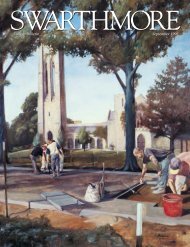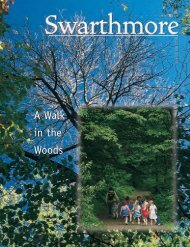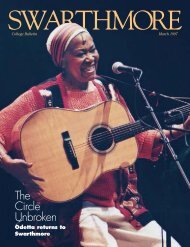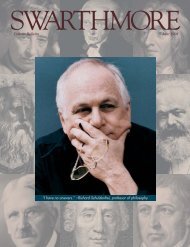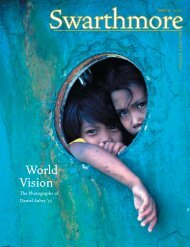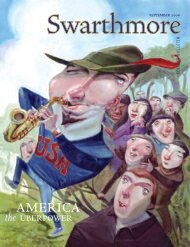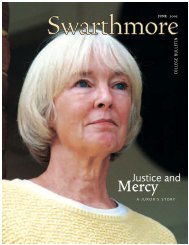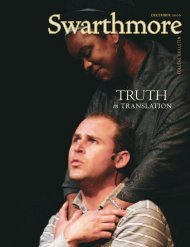TRUTH
Swarthmore College Bulletin (March 2007) - ITS
Swarthmore College Bulletin (March 2007) - ITS
- No tags were found...
You also want an ePaper? Increase the reach of your titles
YUMPU automatically turns print PDFs into web optimized ePapers that Google loves.
Israeli way of life. Brown has two children, Daniel and Rafael, oneof whom has autism.“Although I work, my life revolves around my son’s care and helpinghim learn. He is making progress, and it is very rewarding. Butbecause of this, I probably have not been able to invest time inlearning to acclimate myself to Israel,” Brown says.She describes the special-education bureaucracy in Israel as particularlyrigid, with some administrators who don’t believe thatautistic children can ever be helped in any significant way.“If I weren’t forced into contact with these bureaucrats, then Iwould probably be more positive,” she says. “On the plus side, myson receives treatment at the International Center for the Enhancementof Learning Potential in Jerusalem, founded and run byReuven Feuerstein, a professor who has pioneered extremely effectivetechniques for teaching people with autism, mental retardation,learning disabilities, and brain injuries,” Brown says.WHY NOT?Christian Henry ’96: Cape Eleuthera, Bahamas“It’s a risk to goabroad, but it’sriskier to stayput,” Henr y says.In 1998, after teaching at a private school in New Jersey, ChristianHenry was open to adventure. An opportunity arose when he met anex–Navy Seal who was starting The Island School in the Bahamas, anonprofit school, where groups of students from high schoolsaround the United States, the Bahamas, and Canada can spend 3months experiencing the Eleutheran environment and people firsthand. Henry accompanied the first group of 20 high school studentsto Eleuthera.“It wasn’t so much a question of why liveabroad as much as why not?” says Henry,who divides his time between Eleuthera andBaltimore, where his fiancé lives. “My personalgoal is to do good and do well, as theQuakers used to say. It is important to me tospend time creating a meaningful life formyself and others—and the fruits of thatare a community of learning and growth.”In addition to English, math, and history,Island School students are offered environmentalart and marine ecology. SCUBAdiving, island exploration, and two short kayaking expeditions complementdaily morning exercise. Science research projects and campuswork help students to develop leadership and teamwork skills.The fee for one semester is $15,975 in 2007–2008. Each semester,about 40 percent of the school’s students receive some financialaid; more than $320,000 in scholarships, from small foundationsor private individuals, were awarded this year.“It was so much harder than we expected to start a school fromscratch. Luckily, I have a boss who encourages people to grow.Through Duke’s Cross-Continent Program, which combines oncampusand distance work, I was able to get an M.B.A. and still keepup my duties at the school,” says Henry.After 8 years, the school now has 500 alumni; a local middleschool, founded by the nonprofit Cape Eleuthera Foundation inSeptember 2001, which evolved from The Island School’s CommunityOutreach Program; and a marine science/green technologyresearch institute.As chief financial officer of the foundation since 2004, Henryhelped to develop the school’s academic program. Currently, he isresponsible for management, administration, and development ofrelationships with high schools that send students to the Bahamas.“I am also offering a course in entrepreneurship; it is a first steptoward a longer process of making the lessons of The Island Schoolreal,” Henry says. “It represents one small way we are trying to keepthe promise we make to our students as they get on the plane to gohome. We say that the learning they have done here is only useful tothe degree that it has significant impact in their world.”In 2003, Henry co-founded the Cape Eleuthera Institute, whichprovides research opportunities for students and models sustainablesystems. He received a 2003 Kinship Conservation Institute Fellowshipto study market solutions to environmental issues.“It’s great to be part of a learning community and to feel like ourschool has impact outside the gates,” Henry says. “Young peoplewho have a vision and a way to make it happen in a self-sustainingway—in a way that creates value for everyone involved—are themost powerful force we have to change the world for the better.”Henry lives on campus, 5 miles from Deep Creek, the nearesttown. The supermarket and bank are a 45-minute drive away. Thereis but one doctor on the island, which is a 2-hour flight from Miami.He says that the island “bush” is dense and low; the islands are flat,not volcanic.“Tourism drives the economy here, and because most Americanschoose Nassau and the glitzy casino world of Atlantis, islands likeEleuthera remain depressed. Houses standhalf built; roads have potholes with names;and outside of government jobs, there is littlebesides fishing and farming to keep peoplegoing. But it’s sunny, never dips below50 degrees, and the color of the ocean atsunrise will break your heart every day,” saysHenry, who wakes up for a 6:15 a.m. facultymeeting before an hour of exercise with thestudents.Born in Fort Belvoir, Va., Henry movedevery 4 years until high school as part of acareer army family. He lived in Germany andlearned how to “regrow roots” in new places, he says.“Barry Lopez writes about this great idea of home called thequerencia. It’s Spanish for ‘home’ or ‘hearth,’ but it also is the placein a bullring where a bull retreats to when a matador has hurt it. Itis the place you get your strength from. I have several of theseplaces; one is where I live with my fiancée in Baltimore, where Ispend 2 weeks each month. One is in the woods in Lawrenceville,N.J., where I went to high school. One is in the bell tower atSwarthmore,” he says.“I went back for my 10th reunion. It was powerful to hear thosebells ringing, and it brought me right back to being 19 and giddy onthe smell of daffodils and fresh-cut grass.” TAndrea Hammer is a freelance writer and editorial consultant in Philadelphia.She is the former managing editor of the Bulletin.march 2007 : 19



